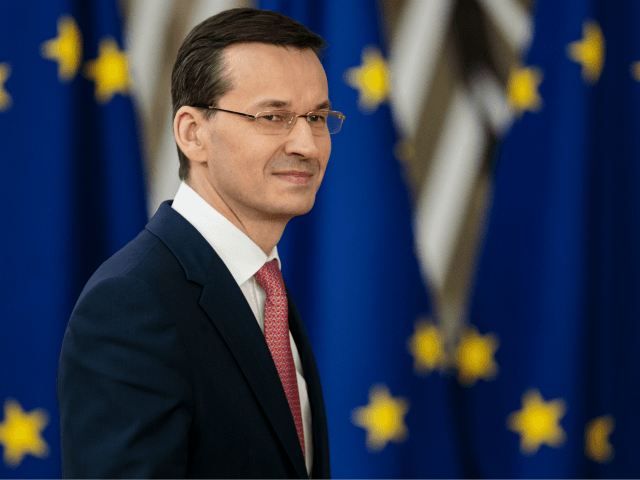Conservative Poland’s prime minister, Mateusz Morawiecki, has said that Europe must enhance its alliance with the United States into the “technological dimension”, especially in the construction of next-generation telecommunications like 5G in order to protect the world from “authoritarian regimes” such as China.
Prime Minister Morawiecki of the socially conservative Law and Justice (PiS) party remarked on how the Chinese coronavirus had laid bare the Western world’s vulnerability in terms of pharmaceuticals and medical equipment.
He also underscored the importance of securing 5G in the post-pandemic world; by comparing it to the advent of the automobile and how it changed the way people travel, telecommunications advancement will change the way information travels, he said.
“Disregarding the need to secure our critical technology would be a mistake for which Europeans would pay a considerable price,” Mr Morawiecki wrote in The Telegraph on Wednesday.
“Today, our globalised world is facing undue influence from authoritarian regimes – at Europe’s expense,” he said, in an allusion to China, whose military reportedly runs tech giant Huawei.
“For this technology to serve us well, its implementation must be based on trust and democratic control. Otherwise, we risk that today’s crisis will be only a prelude to what awaits us if an unauthorised entity takes control of 5G networks and supply chains. Soon, our entire economy will be based on this technology, and unable to function without it,” the Polish premier warned.
His remarks come after the United Kingdom, following the advice of Five Eyes intelligence-sharing ally America, announced on Tuesday that it would ban new purchases of Huawei’s 5G equipment at the end of this year, pulling the Chinese firm’s gear from all of the UK’s 5G networks by 2027. The United States had warned against Prime Minister Boris Johnson’s January decision to allow Huawei to build 35 per cent of the UK’s 5G, citing serious security concerns.
Bond Between America and Poland ‘Stronger Than Ever’ Thanks to Trump, Say Ambassadors https://t.co/TAEM9cUSiU
— Breitbart London (@BreitbartLondon) November 11, 2018
Poland has developed a stronger relationship with the United States under its conservative leadership, with President Andrzej Duda winning reelection this week, relative to other liberal Western European nations like France and Germany which have clashed with President Donald Trump.
President Trump, warmly welcomed by the people of Poland during his 2017 visit, had said in late June that he would “probably” be moving additional troops from Germany to Poland after the President became exasperated with Germany’s failure to hit the minimum target of defence spending and for buying Russian energy. Poland is one of only a handful of NATO members that spends the minimum two per cent of GDP on defence.
In 2018, the mutual American and Polish ambassadors penned a joint letter underlying their countries’ bond, whose “shared democratic ideals are the heart of our 100-year-old friendship… [T]he bond between the United States and Poland is stronger than ever, and we are ready to face the next 100 years together”.
This strong relationship with the United States was underscored in the prime minister’s latter comments in The Telegraph, where he said: “Our alliance with the United States brought prosperity and peace to post-war Western Europe, and to this day brings security to almost all of our continent. My government believes that Europe needs to continue this alliance in a technological dimension, especially when it comes to the construction of our 5G network. This network will soon be omnipresent, and we must keep it secure at all costs.
“To do so, all European entrepreneurs must maintain clean production lines, free from potential industrial espionage – and safe from attacks that could interrupt their operations and harm the entire economy.”
Globalism Loses: National Conservative Polish President Wins Election https://t.co/PrIGXKQpg1
— Breitbart London (@BreitbartLondon) July 13, 2020
On Wednesday, U.S. Secretary of State Mike Pompeo announced visa restrictions on “certain employees of Chinese technology companies like Huawei that provide material support to regimes engaging in human rights violations and abuses globally”.
The decision comes after the U.S. imposed sanctions on Huawei, barring the sale of American-made components. This decision, which would result in Huawei using Chinese elements considered less secure by Western allies, resulted in GCHQ’s National Cyber Security Centre to conclude that Huawei was no longer safe for British use. That ruling fed into the UK’s National Security Council’s ruling to block Huawei, which in turn informed Prime Minister Boris Johnson’s decision this week.
However, the U.S. has been warning the UK for months that Huawei was capable of building a “backdoor” into British systems to facilitate spying by Beijing.
‘America’s Dupe’: China Threatens British Businesses After Decision to Ban Huawei https://t.co/0weIHNC5U4
— Breitbart London (@BreitbartLondon) July 15, 2020

COMMENTS
Please let us know if you're having issues with commenting.